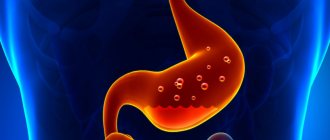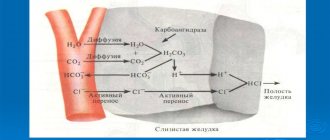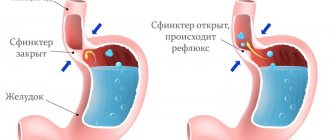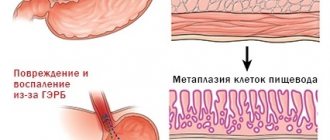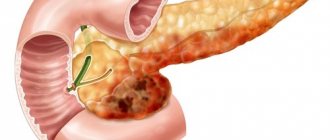Acid reflux is a very common health problem. Other terms used to describe it are gastroesophageal reflux disease or heartburn.
A symptom of acid reflux is “heartburn,” a burning sensation behind the breastbone that sometimes also affects the throat. In some cases, this pain may be severe enough to be mistaken for a heart attack.
Acid reflux is generally thought to be caused by excess stomach acid, so medications are often prescribed to reduce stomach acid levels. However, it is a serious medical error that negatively affects hundreds of millions of people because the problem usually occurs due to a lack of stomach acid.
What Causes Heartburn
After food passes through the esophagus and into the stomach, a muscle called the lower esophageal sphincter tightens so that food and stomach acid cannot return.
Acid reflux occurs when the esophageal sphincter relaxes abnormally, causing stomach acid to flow (back) into the esophagus. However, the most important thing to understand is that acid reflux is not a disease caused by excessive acid production in the stomach ; This is more of a symptom associated with:
- Hiatal hernia
- Helicobacter pylori infection (more than half the world's population is thought to be infected with H. pylori, and the World Health Organization lists it as a Group 1 carcinogen)
Although the above two conditions are not related, many people with a hiatal hernia are also infected with H. pylori, which causes mild but chronic gastritis that can lead to ulcers and associated symptoms.
Main signs of the disease
The release of gastric juice into the larynx is characterized by a number of the following symptoms:
- heartburn;
- belching accompanied by gas and acid;
- pain in the throat area;
- unpleasant sensations appearing in the pit of the stomach;
- increasing active production of bile after eating.
There are one more optional aspect - this is vomiting or any urge to do it along with the release of saliva. At the same time, a feeling of tightness behind the sternum may also be observed.
The release of gastric juice through the esophagus into the larynx is sometimes activated when the upper body bends forward (this happens because the stomach is simply overloaded). Sweets and fatty foods are also the culprits. It has been noted that the condition can worsen significantly during sleep or after a person has consumed alcohol.
The disease can also manifest itself in the form of various pulmonary syndromes. A patient who experiences a release of gastric juice into the larynx often suffers from bronchitis or pneumonia. The chest pain that occurs is very similar to angina pectoris. Heart rate also changes. Sometimes, against the backdrop of everything that is happening, teeth also deteriorate.
There are also external signs of this disease, although they do not provide a complete picture for diagnosis. Some people have enlarged papillae located on the root of the tongue. And others experience insufficient salivation.
Are you experiencing side effects from your medications?
If you have heartburn caused by taking medications , then, of course, the most important thing is to think about how and when to take your medications.
Please do not make the mistake of trying another medicine that could counteract the side effects of the previous medicine.
Here's what you can do:
- Do not take more medicine than prescribed by your doctor or as directed.
- Some medications are best taken on an empty stomach, but there are others that should be taken with food to prevent heartburn. Check the leaflet that comes with your medicine for the recommended way to take it, or ask your doctor for advice.
- Ask your doctor or pharmacist to carefully review all the medications and supplements you take to determine which ones may be causing heartburn.
- Do not lie down for as long as possible after taking the medicine.
- Drink ginger tea.
Traditional methods
How to cure reflux using unofficial means? Unofficial medicine knows many effective ways to treat the disease in question. Before treating reflux esophagitis, you need to consult a therapist: he will help you choose the most effective method of getting rid of the disease.
Let's look at some ways to treat manifestations of reflux esophagitis using non-drug methods.
A medicinal mixture of chamomile, flax, dog nettle, lemon balm leaf, and licorice reduces the intensity of inflammatory phenomena. To prepare the decoction you need to take 2 tbsp. l. plants and brew in boiling water, evaporate in a water bath for 10 minutes. Drink a third of a glass, 4 times a day.
A mixture of calamus, anise, marigold, oregano, mint leaves, marigold and fireweed (2 tablespoons) should be poured with water and heated in water. Drink half a glass 6 times a day.
Polygonum root, plantain leaf, shepherd's purse, dandelion flowers, chamomile, yarrow herb, oregano are mixed and steamed in water. The decoction should also be consumed the same number of times in the same quantity.
This treatment should be combined with drug therapy.
Why heartburn medications do more harm than good
One of the most commonly prescribed medications for heartburn and acid reflux are proton pump inhibitors, which are very effective at blocking the production of acid in the stomach.
While this may seem like a good solution, given that it is stomach acid that enters the esophagus and causes unpleasant symptoms, in most cases it is the worst solution , since the problem is most often caused by too little stomach acid.
There are more than 16,000 articles in the medical literature that clearly indicate that blocking stomach acid production does not solve the problem. This is only a temporary symptomatic treatment.
Proton pump inhibitors were originally intended to treat a very limited range of serious health problems, specifically treating:
- Bleeding ulcers
- Zollinger-Ellison syndrome (a rare disease in which the stomach produces excessive amounts of acid)
- Severe acid reflux in which endoscopic examination has confirmed severe damage to the esophagus
However, 60 to 70% of people taking these drugs have only mild heartburn and should not take such strong drugs. The problem with proton pump inhibitors is that when the amount of acid in your stomach decreases, your body's ability to kill Helicobacter decreases.
So if your heartburn is caused by an H. pylori infection, neutralizing stomach acids will only make the situation worse and will not solve the problem. In addition, acid neutralization in the stomach disrupts the body's primary defense mechanism, which is to fight foodborne infections, and thus increases the risk of food poisoning. Proton pump inhibitors can cause serious side effects such as pneumonia, loss of bone density, hip fractures, and Clostridium difficile infection (a harmful intestinal bacterium).
Warning: Proton pump inhibitors may be addictive
It is worth knowing that the body gradually develops tolerance, gets used to proton pump inhibitors and even becomes dependent on them, so you should not immediately stop taking this drug. This must be done gradually, or you may experience severe withdrawal symptoms. In some cases, problems may be more severe than before you started taking the medicine.
It is best to start taking a dose lower than usual and then gradually reduce it. Once you reach the minimum dose of proton pump inhibitors, you can begin replacing them with over-the-counter H2 blockers such as Tagamet, cimetidine, Zantac, or ranidine. You can then gradually stop taking the H2 blockers over the next few weeks.
Complications in the form of esophagitis
Such pathological release of vomiting along with gastric juice into the larynx can provoke the occurrence of esophagitis - a severe complication with a pain reflex. This manifestation will be facilitated by frequent irritation, which produces gastric juice and exposes the esophagus.
Another unpleasant disadvantage of this manifestation is vomiting with blood in it. All this can lead to iron deficiency anemia. This manifestation is especially dangerous in infants. That is why any, even initial manifestations of the release of gastric juice should be a reason to immediately consult a doctor.
Source: progorlo.ru
First line of treatment – unprocessed food and probiotics
The best answer to heartburn, indigestion and acid reflux is to restore the natural balance and function of the digestive system .
Eating a lot of processed foods and sugar is a sure way to make acid reflux worse because they disrupt the bacterial balance in the stomach and intestines. Instead, you should eat plenty of vegetables and other high-quality, organic, unprocessed foods. In addition, stimulants such as caffeine, alcohol and nicotine products should be eliminated from the diet.
Then make sure your diet contains enough beneficial bacteria. This will help balance the intestinal bacterial flora, which can help eliminate H. pylori bacteria naturally without resorting to antibiotics. It will also help in proper digestion and absorption of food.
It is best to take probiotics in the form of fermented foods. If you do not eat this type of food, it is recommended to supplement with probiotics regularly.
Fermented foods that you can easily make at home include:
- Pickled vegetables
- Acidic dairy products such as yogurt, kefir and sour cream
- Fish such as mackerel or gravlax
Insufficient production of stomach acid
To encourage your body to produce enough hydrochloric acid (stomach acid) , you must also regularly supply it with the appropriate materials.
High-quality sea salt (unprocessed salt), such as Himalayan salt, will provide the body not only with the chlorides needed to produce hydrochloric acid, but also with over 80 other minerals the body needs to function optimally.
Sauerkraut or cabbage juice is also a very strong, if not the strongest, stimulant for stomach acid production. Drinking a few teaspoons of cabbage juice before meals, or better yet sauerkraut juice, can work wonders when it comes to improving digestion.
How to effectively get rid of heartburn and reflux
Raw, unfiltered apple cider vinegar. You can easily increase the acidity in your stomach by drinking one tablespoon of raw, unfiltered apple cider vinegar dissolved in a large glass of water.
Betaine. Another option is to take betaine salts supplements, which can be purchased at over-the-counter health food stores. Take as much as you need to get a slight burning sensation, then reduce the dose by one capsule. This will help your body digest food better and help fight H. pylori bacteria.
Baking soda. Half a teaspoon of baking soda (sodium bicarbonate) dissolved in a glass of water can relieve the burning symptoms associated with acid reflux because the baking soda helps neutralize stomach acid. I don't recommend this method for regular use, but it can help "in a crisis" when the pain is really bad.
Aloe juice. Aloe juice naturally reduces inflammation, making it also relieve the symptoms of acid reflux. Drink about half a glass of aloe juice before meals. If you want to avoid the laxative effects of aloe juice, look for a brand that removes the laxative ingredients found in its juice.
Tea with ginger and chamomile rhizomes. Ginger has been found to act in the gastrointestinal tract by blocking acids and inhibiting the growth of Helicobacter pylori. According to a 2007 study, it is much more effective than lansoprazole in preventing ulcers and is 6-8 times more effective than this drug! Add two or three slices of fresh ginger rhizomes to two cups of hot water. Let it brew for about half an hour. Drink 20 minutes before meals. Before bed, try a cup of chamomile tea to help relieve stomach inflammation and help you fall asleep.
Vitamin D: Vitamin D is important for fighting all infections. When vitamin D levels are optimized, the production of about 200 antibacterial peptides simultaneously increases, which will help eliminate any infections that should not occur in the first place. Increase your body's vitamin D levels by exposure to sunlight or using a safe tan. If none of the above options are available, take vitamin D3 by mouth; just remember to increase your vitamin K2 intake at the same time.
Astaxanthin. Compared to placebo, this extremely potent antioxidant was found to reduce acid reflux symptoms in patients, especially those with severe helicobacter pylori infection. The best results were obtained with a daily dose of 40 mg.
Red elm. It has a soothing effect on the mouth, throat, stomach and intestines and contains antioxidants that may help treat inflammatory bowel disease. It also stimulates the nerve endings in the digestive tract. Helps increase mucus secretion, which protects the gastrointestinal tract from ulcers and excess acid.
A set of Chinese herbs to treat Gu symptoms, including digestive problems. So-called "Gu" symptoms include digestive problems associated with inflammation and pathogen infection.
Glutamine. Research published in 2009 found that gastrointestinal damage caused by H. pylori can be treated with the amino acid glutamine, which is found in many foods such as beef, chicken, fish, eggs, dairy products and some other fruits. and vegetables. L-glutamine, the biologically active isomer of glutamine, is also readily available as a supplement.
Folic acid (vitamin B9) or other B vitamins: Research shows that B vitamins may reduce the risk of acid reflux. Increasing folic acid intake has been shown to reduce acid reflux by approximately 40%. Low levels of vitamins B2 and B6 are also associated with an increased risk of acid reflux. The best way to increase your folic acid levels is to eat foods rich in them, such as liver, asparagus, spinach, okra and beans.
Traditional methods
The treatment regimen for reflux esophagitis includes folk remedies as an auxiliary therapy. In this case, herbal decoctions, healing baths and teas are used.
One of the popular methods for treating reflux with heartburn is baking soda. However, this brings additional harm. During the first passage through the esophagus, the mucous membrane is even more irritated. In response to alkalization, a strong release of acid occurs, and reflux becomes even more aggressive. Therefore, it is advisable to use antacids instead of soda.
Reflux esophagitis, caused by spicy, fatty or smoked foods, can be treated in the initial stage with simple herbs. Herbal decoctions of motherwort, licorice, lemon balm and flax seeds help relieve inflammation.
Esophagitis in adults often causes heartburn and belching. Rose hips, valerian, dandelion flowers and calamus powder save from them. Plantain juice has a strong healing effect. However, it is contraindicated in people with acid reflux.
For the treatment of chronic esophageal esophagitis, chamomile decoctions are made. They can be combined with flax seeds. The product is drunk three times a day. Flax seeds simultaneously have an enveloping effect and reduce high acidity. This is a good prevention of cancer and reduction of symptoms of the disease.
Honey should be consumed a couple of hours before meals. It is advisable not in whole form, but diluted with a small amount of liquid. You should not consume honey during an exacerbation of esophagitis. This will lead to irritation of the esophageal mucosa.
Sea buckthorn oil has a healing effect, improves secretory function and digestion. Potato juice envelops the mucous membrane, creating an additional protective film. This helps reduce heartburn and chest pain.
You Don't Need Medicine to Overcome Acid Reflux
Thus, the answer to stomach problems such as heartburn, indigestion and acid reflux is to restore the natural balance and proper functioning of the gastrointestinal tract .
This is not only beneficial for optimal gut function, but also for long-term health, as gut bacterial flora can improve nutrient absorption and play an important role in mental and physical health.
It is clear from the available medical literature that one cannot be completely healthy until the intestinal bacterial flora is optimized. This is also one of the reasons why eating sugar is so harmful - it upsets the balance of bacterial flora.
Therefore, switching from eating processed foods to all-natural foods is the first and most important step towards health. To further optimize your gut health, make sure you're consuming enough beneficial bacteria from traditionally fermented or fermented foods.
This will help balance the intestinal bacterial flora, which can eliminate Helicobacter naturally. If you suffer from heartburn, acid reflux, gastroesophageal reflux disease (GERD), peptic ulcers or any other conditions associated with abnormal acidity, the strategies listed above will definitely help you.
